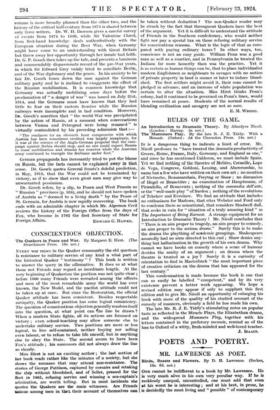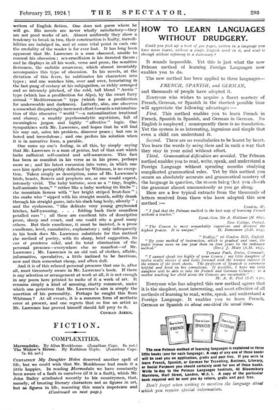POETS AND POETRY.
MR. LAWRENCE AS POET.
ONE cannot be indifferent to a book by Mr. Lawrence. He is very much alive in his own very peculiar way. If he is recklessly unequal, uncontrolled, one must add that even at his worst he is interesting ; and at his best, in prose, he is decidedly the most living and " possible " of contemporary writers of English fiction. One does not guess where he will go. His novels are never wholly satisfactory--they are not good works of art. Almost uniformly they show a tendency to break in two, their construction is faulty, incredi- bilities are indulged in, and at some vital point in each one the credulity of the reader is for ever lost. It has long been apparent that Mr. Lawrence is a man obsessed, unable to conceal his obsession ; sex-crucifixion is his iterated theme ; and he displays in all his work, verse and prose, the sensitive fierceness, the sadistic awareness, which almost invariably accompanies this type of obsession. In his novels, at the dictation of this fever, he sublimates his characters into types ; and one watches him, over and over, luxuriating in the last pang of ecstasy at his subjugation, so richly arranged and so intensely pitched, of the cold, tall blond " Arctic " type (which has a predilection for Alps), by the swart furry animal " Mediterranean " type (which has a predilection for underworlds and darkness). Latterly, also, one observes a somewhat disquietingly increased effort towards a rationaliza- tion of this obsessive " world "—a rationalization irrational and clumsy, a muddy psychoanalytic mysticism, full of meaningless jargon and highly " affective " logic. One Sympathizes with Mr. Lawrence, and hopes that he will find his way out, solve his problem, discover peace ; but one is bored and incredulous ; and one prefers his solution when it is in narrative form, a parable.
One sums up one's feeling, in all this, by simply saying that Mr. Lawrence is a man of genius, but of that sort which lacks sufficient self-control and self-awareness. This fact has been as manifest in his verse as in his prose, perhaps more so ; and his latest excursion into verse, in which one sees him quite perceptibly deflected by Whitman, is no excep- tion. Taken simply as description, some of Mr. Lawrence's birds, beasts, flowers and prophets are, as one would expect, intensely vivid. The baby tortoise, seen as a " tiny, fragile, half-animate bean,'" " rather like a baby working its limbs " ; the mountain lioness with " her bright striped frost-face " ; the snake who " sipped with his straight mouth, softly drank through his straight gums, into his slack long body, silently " ; and the cyclamens, " like delicate very young greyhound bitches, half-yawning, . . . folding back their soundless petalled ears " ; all these are excellent bits of descriptive prose, sharp and exact, and one could cite a good many others. But their excellence, it must be insisted, is a prose excellence, level, cumulative, explanatory ; only infrequently in his book does Mr. Lawrence substitute for this method the method of poetry, with its sharp, brief suggestion, its vox et praeterea nihil, and its total elimination of the personal presence—everywhere else so manifest—of Mr. Lawrence ; Mr. Lawrence in an old suit of clothes, affable, informative, speculative, a little inclined to be facetious, now and then somewhat cheap, and often dull.
And it is of this relaxed personal presence that one is, after all, most tiresomely aware in Mr. Lawrence's book. If there is any selection or arrangement at work at all, it is not enough in any poem here printed to make of it a work of art. It remains simply a kind of amusing, chatty comment, under which one perceives that Mr. Lawrence's aim is simply the assertion of his personality. Perhaps he caught this from Whitman ? At all events; it is a common form of aesthetic error at present, and one regrets that so fine an artist as Mr. Lawrence has proved himself should fall prey to it.
CONRAD AIKEN.











































 Previous page
Previous page